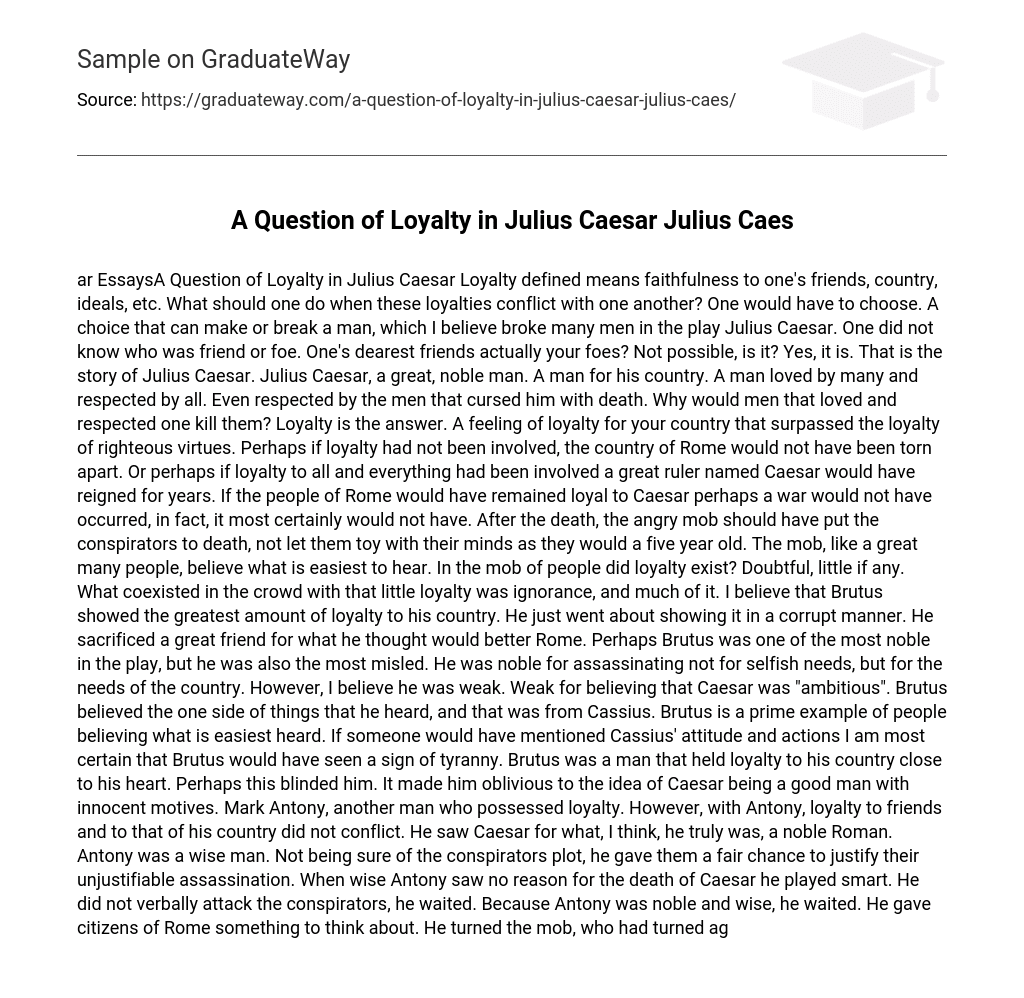In the play Julius Caesar, loyalty is defined as the faithfulness one has towards their friends, country, ideals, and so on. However, when these loyalties clash with each other, a decision must be made that can either strengthen or destroy an individual. From my perspective, this choice shattered the lives of multiple characters. The line between friend and enemy became uncertain – could your closest allies truly be your adversaries? Although it may seem unlikely, this is the essence of Julius Caesar’s story. Julius Caesar himself was an exceptional and noble man who dedicated himself to his homeland. He was beloved by many and respected by all.
Despite being cursed with death, Caesar still commanded respect from the men. The reason why those who loved and respected him would want to kill him is a question that arises. The answer lies in loyalty. Their strong sense of loyalty towards their country outweighed any righteous virtues they possessed. If loyalty had not been a factor, Rome might not have suffered division. Conversely, if loyalty had been extended universally, Caesar could have ruled as an exceptional leader for numerous years.
If the citizens of Rome had stayed faithful to Caesar, there would not have been a war. Instead of letting the conspirators manipulate their minds like they do with children, the furious mob should have executed them after his assassination. Similar to others, the mob believed whatever was convenient for them to hear. Can any loyalty be found within this crowd? Highly unlikely, if at all.
Although the crowd lacked loyalty, they were ignorant. In my view, Brutus displayed exceptional loyalty to his country but in a corrupt manner. He betrayed a dear friend, thinking it would serve Rome’s interests. Perhaps Brutus was one of the most honorable figures in the play; nevertheless, he was also the most misguided. His actions were noble as he assassinated not for personal gain but for the betterment of the nation.
Although I believe that Caesar was “ambitious,” in my opinion, he was weak due to his unquestioning acceptance of Cassius’ perspective as the only truth. Brutus represents those individuals who readily believe what they wish to hear. If someone had mentioned Cassius’ conduct and manner, I am certain that Brutus would have interpreted it as a sign of tyranny. His steadfast loyalty to his country clouded his ability to judge accurately. This prevented him from acknowledging that Caesar was a virtuous individual driven by pure intentions.
Mark Antony, in contrast to others, was a man who exemplified loyalty to both his friends and his country without any conflict. He perceived Caesar as a noble Roman, recognizing his true character. Antony possessed wisdom and when uncertain about the conspirators’ plot, he offered them a fair opportunity to explain their unjustifiable assassination. Observing no valid reason for Caesar’s death, Antony acted astutely.
He refrained from verbally assaulting the conspirators; he chose to exercise patience. Antony, being noble and wise, exhibited this patience. He presented the Roman citizens with something to ponder. He transformed the mob, who had previously turned against Caesar, into a force that opposed the conspirators in support of Caesar. Honorable Antony was prepared to engage in warfare in order to avenge Caesar’s death. He was determined to seek retribution against the individuals responsible for the demise of “the most noble man to have ever existed throughout history.” Julius Caesar, the least deserving person of death, was no longer among the living.
He demonstrated loyalty to his friends, the country, and even strangers of Rome. His actions showed that being loyal to a country also entails being loyal to its citizens. Antony’s soliloquy highlighted Caesar’s compassion, stating that “when the poor have cried, Caesar hath wept.” Being caring is a crucial aspect of loyalty. Caesar was a man who continued to contribute to his country even after his death.
Should this man have been killed? The world continues to require a leader like him. Caesar’s death impacted numerous individuals. Portia, Brutus’ wife, experienced suffering due to her knowledge of the conspiracy. I firmly believe that Brutus made a grave error in confiding in Portia. As a result of her husband’s sinful deeds, Portia chose to end her own life.
Initially, the people were not filled with grief, but over time they were reminded of the love they had for Caesar. Individuals, such as Octavius’ servant, experienced an immediate and heavy burden of sorrow upon discovering his death. This assassination led to the outbreak of a war between Mark Antony and Octavius’ troops and Brutus and Cassius’ troops. Countless individuals endured immense suffering throughout this conflict. Portia, laden with sadness, chose to end her own life.
Shortly after Brutus, Cassius and Titinius also came. The message to readers could be that when someone is narrow-minded and chooses not to see things objectively, they cannot escape from being proven right.





